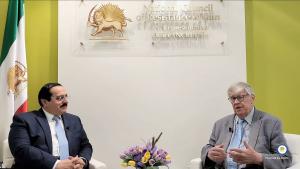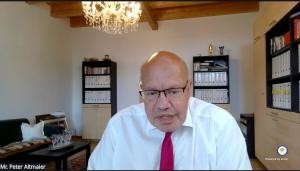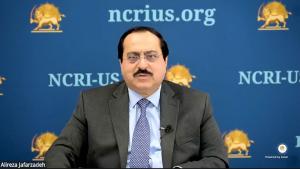Experts at NCRI-US Conference Welcome E3’s Snapback Sanctions, Urge Ending the Iranian Regime’s Nuclear Program

NCRI-US conference on snapback of UN sanctions on Iran, August 28, 2025. Clockwise from top left are Alireza Jafarzadeh, Amb. Robert Joseph, Amb, Joseph DeTrani, and Mr. Peter Altmaier

Dr. Olli Heinonen, former Deputy Director General of the International Atomic Energy Agency (IAEA) and currently a distinguished fellow at the Stimson Center, interviewed by Mr. Alireza Jafarzadeh at the NCRI-US office, August 27, 2025

Ambassador Robert G. Joseph, former U.S. Undersecretary of State for Arms Control and International Security, speaking at the NCRI-US conference on snapback of UN sanctions on Iran, August 28, 2025

Peter Altmaier, former German Minister for Economic Affairs and Energy, and former Head of the Chancellery under Chancellor Angela Merkel, speaking at the NCRI-US conference on snapback of UN sanctions on Iran, August 28, 2025
Maryam Rajavi: Activation of the snapback mechanism and enforcement of UN Security Council resolutions is belated but urgent and necessary
WASHINGTON, DC, DC, UNITED STATES, August 28, 2025 /EINPresswire.com/ -- At an online policy conference, titled, “UN Snapback Sanctions on Iran: Necessity, Effectiveness, and Consequences,” organized by the Washington Office of the National Council of Resistance of Iran (NCRI-US) on Thursday, August 28, 2025, leading American and European diplomats and non-proliferation experts welcomed the decision by France, Germany, and the United Kingdom (E3) to trigger the UN "snapback" mechanism restoring international sanctions on Tehran. They warned, however, that sanctions alone would not prevent Iran from acquiring nuclear weapons unless coupled with a broader strategy supporting the Iranian people’s aspirations for freedom and democracy.
The event, moderated by Alireza Jafarzadeh, Deputy Director of NCRI-US and author of The Iran Threat, brought together four senior figures who have each dealt with Tehran’s nuclear file at the highest levels:
• Ambassador Robert G. Joseph, former U.S. Undersecretary of State for Arms Control and International Security;
• Ambassador Joseph DeTrani, former Senior Advisor to the Director of National Intelligence and U.S. Special Envoy for Six-Party Talks with North Korea;
• Peter Altmaier, former German Minister for Economic Affairs and Energy, and former Head of the Chancellery under Chancellor Angela Merkel;
• Dr. Olli Heinonen, former Deputy Director General of the International Atomic Energy Agency (IAEA) and currently a distinguished fellow at the Stimson Center.
The conference came hours after the E3 formally announced they would begin the process of reimposing UN sanctions on Iran in response to its violations of the 2015 nuclear deal, formally known as the Joint Comprehensive Plan of Action (JCPOA).
Maryam Rajavi: "Activation of the snapback mechanism and enforcement of UN Security Council resolutions is belated but urgent and necessary"
Mrs. Maryam Rajavi, the President-elect of the National Council of Resistance of Iran (NCRI), said, “The fruitless talks last week between the foreign ministers of the three European countries and the foreign minister of the Iranian regime, as well as the failed meeting of deputy foreign ministers on August 26 in Geneva, once again prove the undeniable truth that the mullahs’ regime is not prepared to abandon its project of building a nuclear bomb. This makes the activation of the snapback mechanism and the enforcement of the six UN Security Council resolutions on the regime’s nuclear projects all the more urgent and essential.”
Mrs. Rajavi reminded that as we have repeatedly said before, “No to war and no to appeasement,” the real solution to the Iranian crisis is regime change by the people of Iran and their Resistance. The Iranian Resistance has long warned that appeasement makes war inevitable, a reality we have already witnessed. Without appeasement and concessions, this regime would never have come so close to obtaining the nuclear bomb. In that case, there would have been no war either.”
Ambassador Robert Joseph: “Negotiations have failed—support the Iranian people”
Opening the panel, Ambassador Robert G. Joseph praised the European decision as both necessary and overdue. “It’s very clear that Iran is in violation of the JCPOA. Just look at the stockpiling of 60% enriched uranium, as well as the failure to cooperate with the IAEA on both weaponization issues and suspect sites,” he said.
Joseph outlined four main conclusions:
1. The E3’s decision is the right one, but it may not be the final word. He cautioned that Europe could once again attempt negotiations, which he described as “the triumph of hope over experience.”
2. Zero enrichment must be the red line. Any resumption of talks, he insisted, must adhere to the principle that Iran has no right to enrich uranium.
3. There is a third option beyond war or endless negotiations: supporting the Iranian people and their organized opposition in achieving a free, democratic government. “This is not Iraq, not Libya. Iran is an ancient nation with a people determined to secure their freedom,” Joseph stressed.
4. Time is running out. The regime, weakened by domestic unrest and external strikes on nuclear facilities, could still attempt to sprint covertly toward a bomb.
“This is a brutal, repressive regime guilty of crimes against humanity,” Joseph said. “There is no chance of reform. Negotiations have failed for over 20 years. The only viable option is to help the Iranian people achieve what we achieved 250 years ago: self-determination.”
Joseph underlined that the National Council of Resistance of Iran (NCRI) and the 10-point plan of its President-elect Maryam Rajavi provide “the vision for a democratic, secular, non-nuclear Iran.”
Ambassador Joseph DeTrani: “Iran is on the threshold of nuclear weapons capability.”
Ambassador Joseph DeTrani, who previously directed the National Counterproliferation Center, warned that Iran’s collaboration with North Korea and notorious proliferator A.Q. Khan highlighted Tehran’s longstanding pursuit of nuclear weapons.
DeTrani recalled that U.S. intelligence in 2007 assessed Iran had halted its nuclear weapons program in 2003, but emphasized that Tehran retained expertise, infrastructure, and materials. By 2015, Iran was enriching uranium to 20%—and by 2025, before the recent Israeli and U.S. strikes, Iran was enriching to 60%.
“That’s a clear indicator of weapons intent,” DeTrani said. “You don’t enrich to 60% unless you want to signal you’re within weeks of reaching weapons-grade.”
He highlighted three core concerns:
• Iran’s ballistic missile advances, fueled by North Korean assistance, which could soon yield intercontinental-range capabilities threatening the United States.
• Iran’s denial of IAEA access to suspect facilities, which underscored its illicit intentions.
• Regional destabilization risks, including the prospect of a nuclear arms race involving Saudi Arabia, Egypt, and Turkey.
DeTrani endorsed the E3’s decision to initiate snapback sanctions: “We should be united, resilient, and very clear-minded. This is the correct decision. The world must understand: a nuclear-armed Iran is not just a threat to Israel—it is a global threat.”
Peter Altmaier: “For the first time in years, the West is united.”
Speaking from Berlin, Germany, former minister Peter Altmaier described the snapback decision as a turning point for Europe’s role in global security. “For the first time in more than six years, the Western world is now united—at least as regards the nuclear program,” he said.
Altmaier contrasted the present moment with Europe’s divisions during the Trump administration, when Berlin, Paris, and London resisted Washington’s withdrawal from the JCPOA. He credited Chancellor Friedrich Merz, alongside UK Prime Minister Keir Starmer and French President Emmanuel Macron, for forging unprecedented trilateral cooperation.
“This was a good day for the Iranian people,” Altmaier said. “The weakness of the regime has been exposed by Israeli and U.S. strikes on nuclear facilities, and now Europe has taken the initiative to trigger the mechanisms. They are serious.”
While welcoming the new unity, Altmaier acknowledged that governments in Europe and the U.S. are not yet prepared to adopt explicit regime-change policies. But he argued that much more could and should be done to support the Iranian opposition and civil society:
“Nobody can hinder us from encouraging the people on the ground, from strengthening support networks for the Iranian opposition. We must do more to unite the Western world, and also to help unify the Iranian democratic opposition.”
He cited growing support for NCRI President-elect Maryam Rajavi’s Ten-Point Plan in the U.S. Congress and expressed hope for similar recognition in European parliaments.
Dr. Olli Heinonen: “Iran must come clean—IAEA findings cannot be ignored”
In a pre-recorded interview, Dr. Olli Heinonen, former IAEA Deputy Director General, offered a technical assessment of Iran’s compliance.
“Iran has not been complying with all its obligations under the Comprehensive Safeguards Agreement. When the IAEA says something doesn’t fit with Iran’s declaration, it means the facts do not match. The Agency does not manipulate,” Heinonen stressed.
He recalled past turning points—in 2003, 2005, 2010, and 2015—when Iran faced critical choices but opted to escalate rather than come clean. “Now is another such decision point. Iran must decide whether to cooperate with the IAEA and integrate with the international community, or continue its current course,” he said.
Heinonen argued that the snapback mechanism is an opportunity for the regime to change course but warned against simply reviving the JCPOA in its flawed form. Instead, he called for new arrangements ensuring dismantlement of any weapons-related capabilities and intrusive monitoring, as was done in South Africa, Iraq, and Libya.
“If Iran maintains its current pattern, it will be a disservice to the entire non-proliferation regime,” Heinonen concluded.
Alireza Jafarzadeh: “The Iranian Resistance has been the decisive force against the bomb”
In closing the discussion, Alireza Jafarzadeh, Deputy Director of NCRI-US and moderator of the conference, emphasized that the E3’s decision to trigger the snapback mechanism was “just the first step—like opening the door to a whole new world that was not there before.”
“All of our speakers pointed out that appeasement has failed and that only regime change can end the nuclear threat,” Jafarzadeh said. “But this is not just a dream or the abstract desire of a nation for freedom. There is already a capable, potent, and organized movement for change—the Iranian Resistance—which for decades was deliberately overshadowed by the policy of appeasement.”
Jafarzadeh underscored that the NCRI and MEK have played a decisive role in exposing Tehran’s clandestine programs. “The biggest factor preventing the regime from getting the bomb, according to their own confessions, has been the Iranian Resistance. We revealed secret nuclear program as early as 1991. It was our disclosure of Natanz that triggered IAEA inspections. We exposed over 40 sites tied to the missile program, and in Washington we were the first to uncover Tehran’s drone project back in 2020. We also uncovered their terror networks, including the 2018 Paris bomb plot by a regime diplomat whose target was Mrs. Maryam Rajavi.”
Pointing to the resistance units inside Iran, Jafarzadeh said they carried out over 3,000 operations against the IRGC in the past year alone. “This is why the regime fears this movement more than anything else, and why for years it demanded that Western governments blacklist or restrict the NCRI and MEK as part of any negotiation. That appeasement strategy is what allowed Tehran to expand its nuclear program.”
He added that the Resistance has also built a vision for the future of Iran: “A democratic republic that separates religion and state, where the ballot box—not inheritance or theocracy—is the source of legitimacy. A platform led by women, embodied in Mrs. Rajavi’s Ten-Point Plan, has earned the support of thousands of lawmakers worldwide.”
“This is the new reality of Iran,” Jafarzadeh concluded. “The people of Iran are determined to end clerical rule. Imagine a free, democratic, non-nuclear Iran. That would not only transform the lives of Iranians, but also reshape the future of the Middle East and end the proliferation threat once and for all.”
A consensus: Snapback is necessary, but not sufficient
Across the board, speakers stressed that while restoring UN sanctions is an important step, it is not enough to stop Tehran’s nuclear march.
Ambassador Joseph noted that sanctions “erode the regime’s legitimacy, already at an all-time low,” but would not fundamentally alter its behavior. DeTrani warned that Iran’s advanced centrifuges could allow rapid reconstitution of its program even after strikes. Altmaier emphasized that only by empowering the Iranian people and democratic opposition could lasting change be achieved. Heinonen cautioned that unless Iran fully discloses and dismantles its weaponization activities, the world will face recurring crises.
The panelists agreed that the regime is weaker than it appears, increasingly isolated internationally, and facing deep domestic discontent. Supporting the Iranian people’s demand for freedom, they argued, is the third and only sustainable option beyond failed negotiations or indefinite military strikes.
The NCRI-US conference underscored a rare transatlantic convergence on Iran policy, crystallized in the E3’s snapback decision. For the first time in years, Washington and Europe appear aligned on recognizing Tehran’s nuclear threat as urgent and unacceptable.
But the experts warned that unless this moment is seized to pursue a broader strategy—combining pressure with support for democratic change in Iran—the world may soon face the nightmare of a nuclear-armed state sponsor of terrorism.
As Ambassador Robert Joseph put it: “I don’t know what the spark will be—a public act of defiance, the murder of another young woman in custody—but I know what’s coming. The Iranian people want an end to the religious dictatorship. We must stand with them.”
Alirreza Jafarzadeh
National Council of Resistance of Iran U.S. Office
+1 202-747-7847
email us here
Visit us on social media:
LinkedIn
Bluesky
Instagram
Facebook
YouTube
TikTok
X
Online Transatlantic Conference by NCRIUS-UN Snapback Sanctions on Iran: Necessity, Effectiveness, & Consequences
Legal Disclaimer:
EIN Presswire provides this news content "as is" without warranty of any kind. We do not accept any responsibility or liability for the accuracy, content, images, videos, licenses, completeness, legality, or reliability of the information contained in this article. If you have any complaints or copyright issues related to this article, kindly contact the author above.


